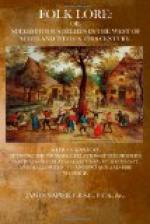commend itself to the reader, it will at once become
apparent that the only way by which freedom from superstition
can be attained is to search Nature and Revelation
for correct views of God and His methods of working.
Notwithstanding our pretensions to a correct religious
knowledge, a pure theology, and freedom from everything
like superstition, it is strange yet true, that, if
we except the formulated reply to the question in the
Westminster Catechism, “What is God,”
scarcely two persons—perhaps no two persons—have
exactly the same idea of God. We each worship
a God of our own. In one of the late Douglas
Jerrold’s “Hedgehog Letters” he
introduces two youths passing St Giles’ Church
at a lonely hour, when the one addresses the other
thus:—“The old book and the parson
tell us that at the beginning God made man in his
own image. We have now reversed this, and make
God in our image.” A sad truth, although
not new; Saint Paul made a similar remark to the philosophic
Athenians; but the remark applies not to this age
or to Saint Paul’s age alone—its
applicability extends to every age and every people.
As Goethe remarks, “Man never knows how anthropomorphic
he is.” Our minds instinctively seek an
explanation of the cause or causes of the different
phenomena constantly occurring around us, but instinct
does not supply the solution. Only by patient
watching and consideration can this be arrived at;
but in former ages scientific methods of investigation
were either not known, or not cared for, and so men
were satisfied with merely guessing at the causes
of natural phenomena, and these guesses were made
from the standpoint of their own human passionate intelligence.
Alongside the intelligence everywhere observable in
the operations of nature they placed their own passionate
humanity, they projected themselves into the universe
and anthropomorphised nature. Thus came men to
regard natural phenomena as manifestations of supernatural
agency; as expressions of the wrath or pleasure of
good or evil genii, and although in our day we have
made great advances in our knowledge of natural phenomena,
the majority of men still regard the ways of providence
from a false standpoint, a standpoint erected in the
interests of ecclesiasticism. Churchmanship acts
as a distorting medium, twisting and displacing things
out of their natural relations, and although this
influence was stronger in the past than it is now,
still there remains a considerable residuum of the
old influence among us yet. For example, we are
not yet rid of the belief that God has set apart times,
places, and duties as specially sacred, that what is
not only sinless but a moral obligation at certain
times and places becomes sinful at other times and
places. Ecclesiastical influence thus familiarises
us with the distinctions of secular and sacred, and
we hear frequent mention made of our duties to God
and our duties to man, of our religious duties and
our worldly duties, and we frequently hear religion




